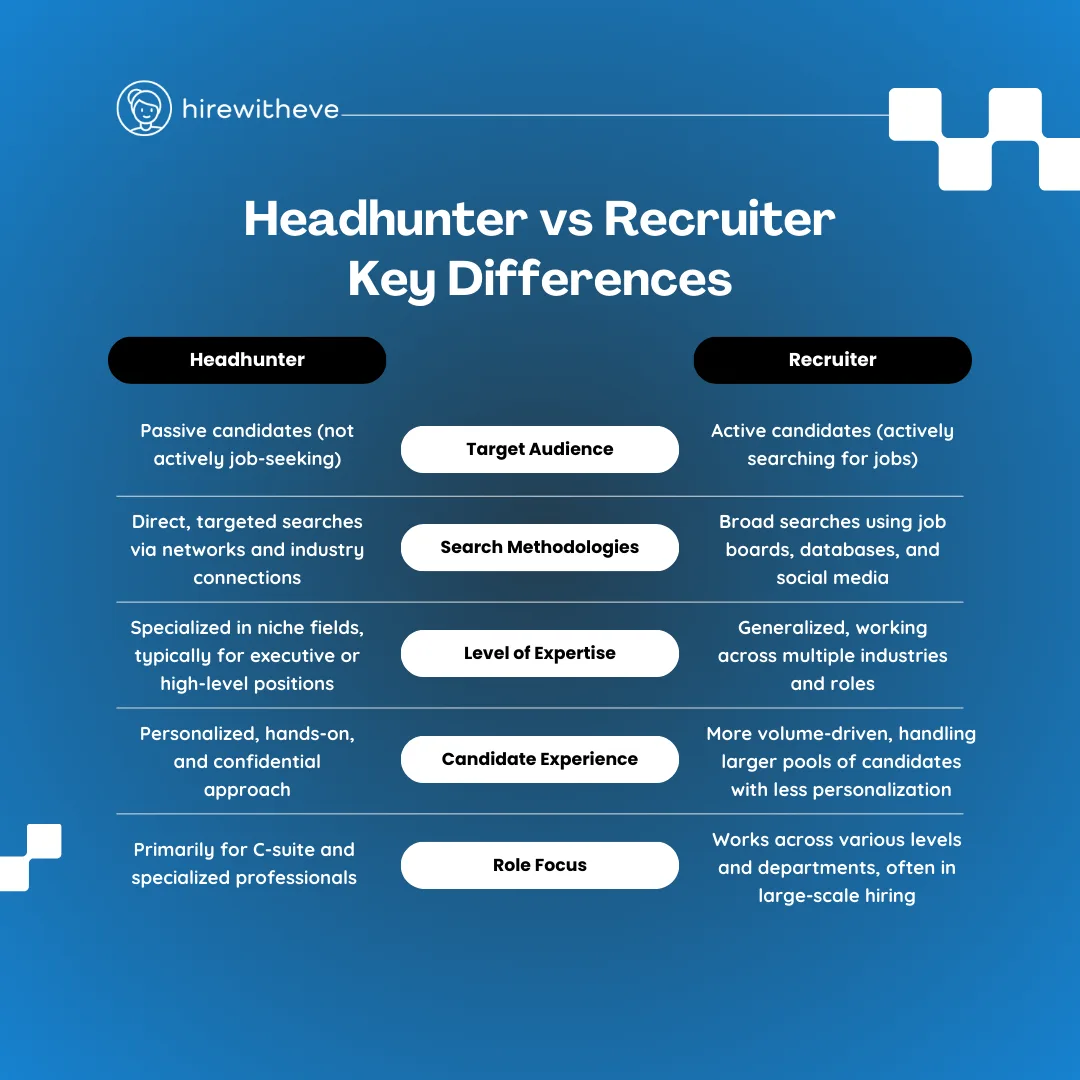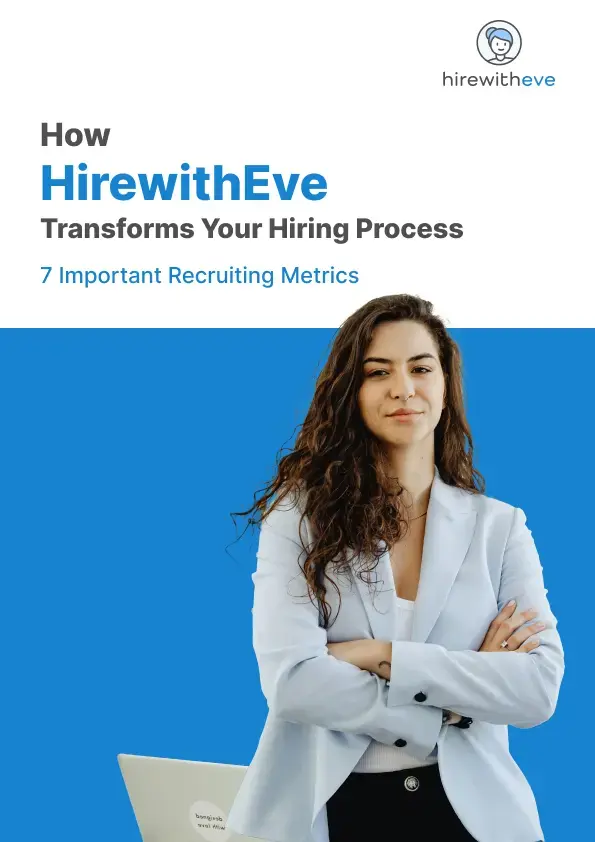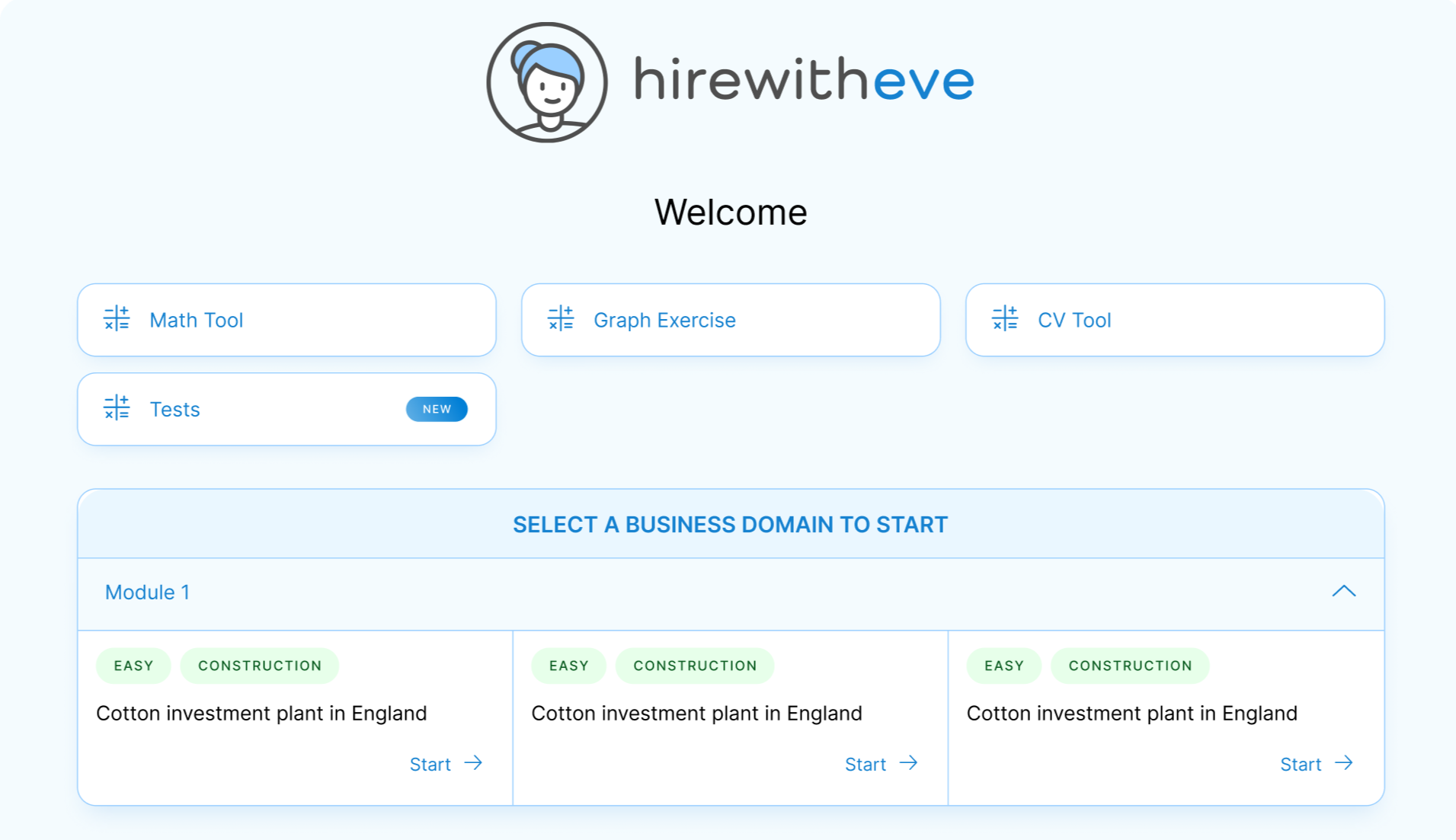Headhunter vs Recruiter: Understanding the Differences and Choosing the Right Approach for Your Hiring Needs

In an increasingly competitive job market, companies are under pressure to attract, identify, and secure the best talent for their organization. However, the approach to recruitment is not a one-size-fits-all process. Whether a company is hiring entry-level staff or seeking top-tier executives, the methods they employ can dramatically impact the quality of candidates they attract and how quickly they can fill positions.
This is where the headhunter vs recruiter debate comes into play. For talent acquisition specialists and HR managers, knowing when to utilize a headhunter versus a recruiter can mean the difference between a successful hire and a long, drawn-out recruitment process. Both headhunters and recruiters are valuable resources in the world of hiring, but their approaches, expertise, and areas of focus differ substantially. Understanding these differences is key to optimizing your recruitment strategy and ensuring your organization gets the talent it needs, when it needs it.
For example, if your company is seeking a CEO or a highly specialized technical expert, you may lean toward hiring a headhunter. But if you need to fill several mid-level positions across various departments, a recruiter would likely be more suited to your needs.
Using platforms like HirewithEve, which integrates features for both headhunters and recruiters, can help streamline the hiring process and make your talent acquisition efforts more efficient. Understanding how headhunter vs recruiter approaches fit within the broader context of your company’s hiring goals allows you to make informed decisions and avoid common recruitment pitfalls.
Table of contents
Defining the Role of a Headhunter
Defining the Role of a Recruiter
Headhunter vs Recruiter: Key Differences
When to Use a Headhunter vs Recruiter?
How HirewithEve Can Streamline Your Headhunter and Recruiter Collaboration?
Headhunter vs Recruiter: Making the Right Choice for Your Company
The Future of Recruitment: How HirewithEve is Leading the Way
Conclusion
Defining the Role of a Headhunter
A headhunter is often referred to as an executive recruiter, but their role goes beyond traditional recruitment. Headhunters are highly specialized professionals who are tasked with finding top-tier talent for specific, often high-level or niche positions within a company. These roles are typically critical to the organization’s success, such as C-level executives, senior directors, or experts in specialized fields like engineering, finance, or technology.
Unlike general recruiters, headhunters are focused on a targeted approach to finding passive candidates — those who are not actively seeking a job but may be open to considering a new opportunity if the right position comes along. This means headhunters often rely on a mix of deep industry knowledge, networking, and research to identify and approach the best candidates for a specific role.
Characteristics of Headhunters:
Targeted Search: Headhunters are known for their precise search methodologies, focusing on highly qualified individuals rather than casting a wide net.
Niche Expertise: Headhunters typically have industry-specific knowledge and expertise, allowing them to understand the nuances of the role they are trying to fill.
Confidentiality: Often, companies prefer headhunters for high-level roles because of the discretion and confidentiality they offer. Executive searches can be sensitive, and headhunters ensure that the process remains private until a candidate is secured.
Key Takeaways for Talent Acquisition Specialists:
The decision to hire a headhunter should be driven by the specific requirements of the role you are trying to fill. If the position is highly specialized or executive-level, and you require a candidate with deep expertise or unique skill sets, a headhunter is the ideal choice. Additionally, using a headhunter ensures that the search is handled discreetly, which is particularly important when replacing senior executives.
Defining the Role of a Recruiter
A recruiter, in contrast, tends to work on a broader scale. Recruiters are involved in the end-to-end hiring process for a variety of roles, from entry-level to mid-management, across multiple departments and industries. Unlike headhunters, who focus on targeted executive searches, recruiters often manage large pools of candidates and actively engage with job seekers who are looking for new opportunities.
Recruiters can be in-house, working directly for a company’s HR department, or externally, employed by a recruitment agency. Their primary focus is on managing the hiring process from start to finish, which includes creating job postings, sourcing candidates, screening applicants, conducting interviews, and assisting with negotiations.
Characteristics of Recruiters:
High-Volume Searches: Recruiters are often responsible for handling multiple job openings simultaneously, and their search tends to attract a high volume of applicants.
Job Boards and Active Searches: Recruiters utilize job boards, social media, and recruiting databases to source candidates who are actively seeking employment.
Process Management: Recruiters are deeply involved in managing the recruitment process, from reviewing applications to coordinating interviews and negotiating offers.
Key Takeaways for Talent Acquisition Specialists:
Recruiters are ideal for filling a range of positions across various levels of the company. Their ability to handle high-volume recruitment efforts makes them valuable for organizations that need to hire multiple employees quickly. If your company is scaling or hiring across various departments, using a recruiter will help you efficiently manage the hiring pipeline.
In-House vs External Recruiters:
In-House Recruiters: Employed directly by your company, in-house recruiters have a deep understanding of the organization’s culture, values, and long-term goals. This allows them to better match candidates to the company’s needs.
External Recruiters: These professionals work for recruitment agencies and can offer a wider range of candidates. However, they may not have the same intimate knowledge of your company’s unique needs as in-house recruiters do.
Headhunter vs Recruiter: Key Differences
In the debate between headhunter vs recruiter, it's essential to understand their distinct roles and approaches. While both are crucial for talent acquisition, they operate differently depending on the company's hiring needs. The following table highlights the key differences between a headhunter vs recruiter, making it easier for talent acquisition specialists and HR managers to choose the right path for their hiring strategies.

By understanding these differences between a headhunter vs recruiter, HR managers and talent acquisition specialists can make more informed decisions on which approach best suits their hiring needs. Whether it's the personalized expertise of a headhunter or the efficiency of a recruiter, each plays a critical role in ensuring the right talent is brought into the organization.
When to Use a Headhunter vs Recruiter?
Deciding between using a headhunter vs recruiter is not always straightforward, but understanding when to deploy each can greatly impact your hiring success. Each brings distinct advantages depending on your business needs, budget, and the types of roles you’re trying to fill.
When to Use a Headhunter:
A headhunter is best suited for high-level and niche roles where the pool of suitable candidates is limited, or when confidentiality is critical. For example, if you’re looking to fill a C-suite executive position like a CEO, CFO, or a specialized role in fields such as technology or healthcare, a headhunter can provide access to talent you wouldn’t typically find through traditional recruiting channels.
Headhunters focus on passive candidates—those who are not actively seeking new roles but may be open to the right opportunity. This makes headhunters valuable when you’re looking to bring in top-tier talent from competitors or professionals who are excelling in their current positions but may not be available through job boards.
Additionally, the headhunter’s expertise in negotiation and relationship-building can be invaluable for roles that require discretion or where the compensation package is highly competitive. They work closely with both you and the candidate to ensure a smooth hiring process, often making them a more strategic option for long-term, high-impact roles.
Use a headhunter if:
You need to fill senior or executive-level roles.
The position requires very specialized skills or experience.
The candidate pool is limited or highly competitive.
You need a more personalized and confidential approach.
The hire is critical to your company’s future growth and performance.
When to Use a Recruiter:
On the other hand, a recruiter is ideal for filling a wide range of roles, particularly when you need to fill multiple positions or find candidates quickly. Recruiters excel at managing high-volume hiring, using job boards, social media, and applicant tracking systems (ATS) to sift through large numbers of candidates.
Recruiters are typically more cost-effective for mid-level or entry-level roles where the focus is on finding a good cultural fit and meeting general job requirements. They are skilled at handling larger-scale recruitment efforts, which makes them invaluable for growing companies or those in industries with high turnover, such as retail or customer service.
Recruiters also handle the full recruitment cycle — from sourcing candidates to managing interviews and facilitating offers — allowing your in-house team to focus on other aspects of HR and operations.
Use a recruiter if:
You need to fill multiple roles in a short time frame.
The position is mid-level or entry-level.
You’re looking for active job seekers who are readily available.
Volume hiring is required, such as for seasonal or high-turnover positions.
You want a cost-effective, streamlined process for standard roles.
How HirewithEve Can Streamline Your Headhunter and Recruiter Collaboration?
Whether you’re working with a headhunter vs recruiter, the HirewithEve platform provides the tools and insights you need to make the recruitment process more efficient and effective.
Skills-Based Hiring
One of the most powerful features of HirewithEve is its ability to facilitate skills-based hiring. For both headhunters and recruiters, this ensures that candidates are evaluated on their abilities rather than just their past job titles or credentials. This is especially beneficial when searching for niche or high-level talent through headhunters, or when managing a high volume of candidates as a recruiter.
ATS Integration and Efficiency
HirewithEve integrates seamlessly with Applicant Tracking Systems (ATS), making the job easier for both headhunter vs recruiter. The platform allows for efficient candidate management, tracking, and communication, ensuring no candidates slip through the cracks.
Analytics and Reporting
One of the key challenges in the headhunter vs recruiter process is understanding the effectiveness of your recruitment strategies. With HirewithEve, you can access detailed analytics and reports that provide insights into the success rates of your headhunting or recruitment efforts. This data-driven approach allows you to continuously optimize your talent acquisition process.
Headhunter vs Recruiter: Making the Right Choice for Your Company
The choice between headhunter vs recruiter is more than just a decision about roles — it’s about aligning your recruitment strategy with the broader needs of your organization. Each option brings its strengths, and sometimes, the best approach may even involve a combination of both, depending on the hiring demands you face at different stages of your business.
Strategic Considerations for Hiring:
At an executive level, businesses need leaders who can not only perform their job duties but also drive long-term success. For roles like these, the discretion and industry knowledge that a headhunter brings are invaluable. They are experts at engaging passive candidates and presenting them with attractive opportunities that align with their career aspirations. In this case, investing in a headhunter is a strategic decision that can lead to transformative hires for your organization.
Conversely, when hiring for operational roles or growing teams quickly, using a recruiter makes more sense. Recruiters are equipped to manage large-scale recruitment processes, leveraging Applicant Tracking Systems (ATS) and job boards to ensure you find candidates who meet the basic requirements and are a cultural fit.
In the debate of headhunter vs recruiter, there’s no one-size-fits-all answer, and the decision often depends on factors like:
The complexity of the role: The more specialized the role, the more likely you’ll need a headhunter.
Time pressure: Recruiters are typically faster in finding candidates for more general roles.
Budget: Headhunters are often more expensive due to their specialized services, while recruiters can provide more cost-effective solutions for large-scale hiring.
How HirewithEve Helps Make the Right Choice:
HirewithEve is designed to support both headhunting and recruiting efforts, making it easier for HR managers to choose the right path depending on their specific needs.
Skills-Based Hiring: Whether you’re using a headhunter or a recruiter, skills-based hiring is at the core of what HirewithEve does. By focusing on the abilities and qualifications of candidates, the platform helps you identify the right fit more efficiently, whether you're sourcing candidates for a specialized role or filling multiple positions quickly.
Data-Driven Insights: HirewithEve’s analytics tools provide critical data that help you assess the effectiveness of your recruitment strategies, whether you’re working with a headhunter or recruiter. You can monitor performance metrics like time-to-hire, candidate quality, and sourcing effectiveness to ensure you’re maximizing your recruitment ROI.
The Future of Recruitment: How HirewithEve is Leading the Way
The recruitment landscape is continuously evolving, and the debate between headhunter vs recruiter will likely continue as businesses adapt to new hiring challenges. HirewithEve is at the forefront of this evolution, offering innovative tools like skills-based hiring, ATS integration, and advanced analytics that empower HR teams to make smarter, faster hiring decisions.
Conclusion
In conclusion, the comparison between headhunter vs recruiter boils down to the unique needs of your business. Both play critical roles in the recruitment process and understanding when to leverage one over the other can greatly enhance your ability to attract and retain top talent.
HirewithEve provides the perfect platform to support both approaches, offering key features such as skills-based assessments, seamless ATS integration, and data-driven insights. Whether you need a headhunter for executive roles or a recruiter for filling multiple positions, HirewithEve ensures you have the right tools for the job.
Target Your Talent
Unlock tailored solutions for your recruitment and hiring needs with Eve Platform's extensive case study library.
Subscribe now to enhance your HR expertise and excel in your role.
Free Resources

Transforming Hiring: 7 Key Recruiting Metrics
Enhancing recruitment processes with data-driven insights for better hiring outcomes.

Reducing Hiring Bias with Hirewitheve.
Utilizing Hirewitheve to combat bias and streamline recruitment processes effectively.

Hiring Detail-Oriented Candidates
HirewithEve enhances hiring by accurately assessing candidate's attention to detail-oriented.








